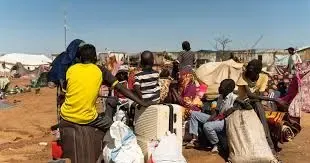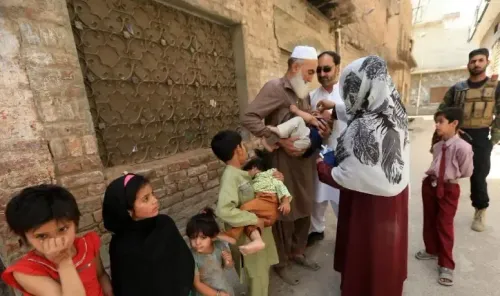Displaced Individuals Escape Sudan Camp Assault Only to Face Shelling in Another: UN

Synopsis
Key Takeaways
- 400,000 individuals displaced from Zamzam camp.
- Access to Zamzam camp is completely blocked.
- Shelling continues in El Fasher and Abu Shouk camps.
- WFP aims to assist 1 million people in the next month.
- Urgent need for humanitarian access and aid delivery.
United Nations, April 18 (NationPress) A significant number of the estimated 400,000 individuals fleeing the Zamzam displacement camp bombardment sought refuge in another Sudanese camp, only to encounter shelling there as well, the UN humanitarian agency reported.
“Access to Zamzam remains entirely obstructed,” stated the UN Office for the Coordination of Humanitarian Affairs (OCHA).
“Reports from local authorities and partners suggest that armed factions are still targeting El Fasher and surrounding regions, including Abu Shouk camp, which puts all civilians there at considerable risk.”
The majority of the 400,000 individuals who fled the Zamzam camp bombardment have moved to the towns of El Fasher, the capital of North Darfur state, and Tawila, where local communities are already facing extreme pressure.
The agency noted that despite the prevailing insecurity, aid organizations are striving diligently to address urgent needs, as reported by Xinhua news agency.
The United Nations and its humanitarian partners have sent 1,700 metric tonnes of emergency food supplies to Tawila. Additionally, a local partner has initiated a water trucking project to provide clean water to 10,000 newly displaced individuals in El Fasher.
International NGOs are currently conducting a humanitarian assessment in Tawila to identify immediate needs and set response priorities.
Stephane Dujarric, spokesperson for UN Secretary-General Antonio Guterres, mentioned that the World Food Programme (WFP) reported that one of its teams arrived on Thursday in greater Khartoum, where it is collaborating with local authorities to enhance assistance in the capital.
“WFP aims to broaden aid deliveries to nearly 1 million individuals over the forthcoming month,” Dujarric stated.
“WFP also reported that a convoy with 14 trucks carrying over 280 metric tonnes of food and nutrition supplies has reached Jabal Awlia, located south of Khartoum, with the delivery occurring this (Thursday) morning. This area is at a high risk of famine, making this delivery critically important.”
Famine conditions had previously been declared in the Zamzam camp and several other locations in Sudan.
Dujarric added that the aid deliveries to Khartoum mark the first assistance into Jabal Awlia since last December. The initial aid convoys are intended for approximately 23,000 individuals, with additional trucks on the way. This convoy is just one of many planned aid deliveries to the greater Khartoum metropolitan area in the coming weeks.
“All this aid is vital to assist vulnerable communities, and our humanitarian colleagues are informing us that aid organizations are putting in significant efforts to meet urgent needs,” the spokesperson indicated.
Cross-border and cross-conflict line aid deliveries are also ongoing.
“In March, 156 trucks carrying over 5,600 metric tonnes of assistance entered Sudan via the Adre crossing from Chad, while 146 trucks transported more than 4,000 metric tonnes of aid to other regions of the country,” Dujarric said.
OCHA reported that humanitarian access is being severely compromised by delays in visa approvals by Sudan for humanitarian staff.
“Only 16 percent of visa applications were approved in March, a troubling decrease from previous months, which was around 50 percent,” OCHA stated. “This trend could severely impact life-saving operations if it continues.”
Dujarric emphasized that the United Nations continues to call for the immediate cessation of hostilities in Sudan, urging all parties to adhere to their obligations under international humanitarian law, ensure the protection of civilians, and facilitate safe and unrestricted humanitarian access.










